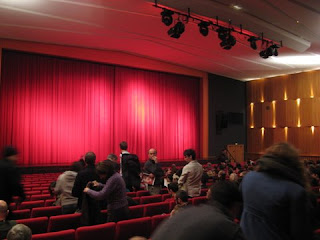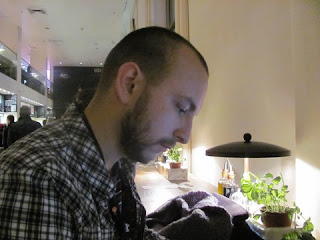Miranda July’s directorial style represents
the best and the worst of what the American indie cinema has to offer. There is
the corny, over the top and at the same time dull story-telling which she
manages to combine with a masterful, daunting study of human behaviour. The
lack of an appropriate balance of these two ingredients is what kept her first
feature film Me, You and Everyone We Know
from expanding outside its comfort zone and becoming something more than a
mediocre flick. It goes without saying that I was slightly apprehensive when
going to see her latest film, The Future.
While hoping that I would be nicely surprised, I was definitely prepared for
the worst.
And yet again, what I got was a mix of
both; some aspects of the film truly disappointed while the others made me
extremely excited. The disappointing parts are a result of Miranda’s choice to
assign her dramatic arc to a semi-comedy formula. Every time the film takes an
emotional plunge into the depths of the human psyche, July very quickly brings
it back to the surface with comic relief, assuming that her audience won’t be
able to stand the pressure should the film get too serious. She talks in her
film about displeasure with life, an inability to control our fate and sexual
desires. But July very forcefully tries to balance these issues with
situational farce which to me, not only belittles the importance of the
portrayed matters but suggests that the dramatic aspects of our existence
aren’t entertaining enough for a film.
The starting point of the film is when
Sophie (July) and Jason (Linklater) decide to adopt a cat. They see that as a
very important step in their relationship, a commitment that requires long time
sacrifices from both of them. Their new pet must undergo surgery and it takes
an additional month before they can bring it home with them. They take
advantage of that convenient ‘delay’ and they decide to re-evaluate their lives
and find out what to do with their future. Their process of discovery is
juxtaposed with a commentary of Paw-Paw, their newly adopted cat who longingly
looks forward to the moment when the couple will come back to take him home.
Paw-Paw sets a rather sad, sentimental tone for the story, and is probably the
nicest feature of the entire film. As he looks through the bars of his cage,
counting down minutes and seconds to the fulfilling moment of becoming a part
of his new family, we see Jason and Sophie turning into prisoners of their own desires.
The two quit their jobs and undertake
activities that are supposed to enrich their existence and bring happiness. But
breaking with the routine pulls the couple away from each other as it brings a
scary realisation that they are no longer bound by any expectations from the
outside world. The feeling of freedom makes them happy for a while, but in the
long run brings a terrifying awareness that they lack any ambition. With the extra
time on her hands, Sophie begins an affair with Paw-Paw’s ex-owner, and Jason
spends his days talking to a randomly met older man who treats him to stories
about his dead wife. Sophie’s eccentric behaviour is the cause of her affair
falling apart in the end, and Jason is too scared to face the reality of a
break-up and literally freezes time in order to avoid confrontation.
With her use of surreal aesthetics in the
final moments of the film July stumbles upon something spectacular but it positively
takes her far too much time to get to that point. Although charmed by Paw-Paw’s voiceover and the ending sequences,
I found myself mostly disinterested by July’s slow and safe narration preceding
the final scenes. The characters doom their happiness by constant longing for
the future. Similarly to that, July hangs her film’s potential for greatness
somewhere towards the end, but that promise seems too far in the future for
someone who doesn’t find the first two-thirds of the film engaging enough to
care about the characters’ fate.




















































